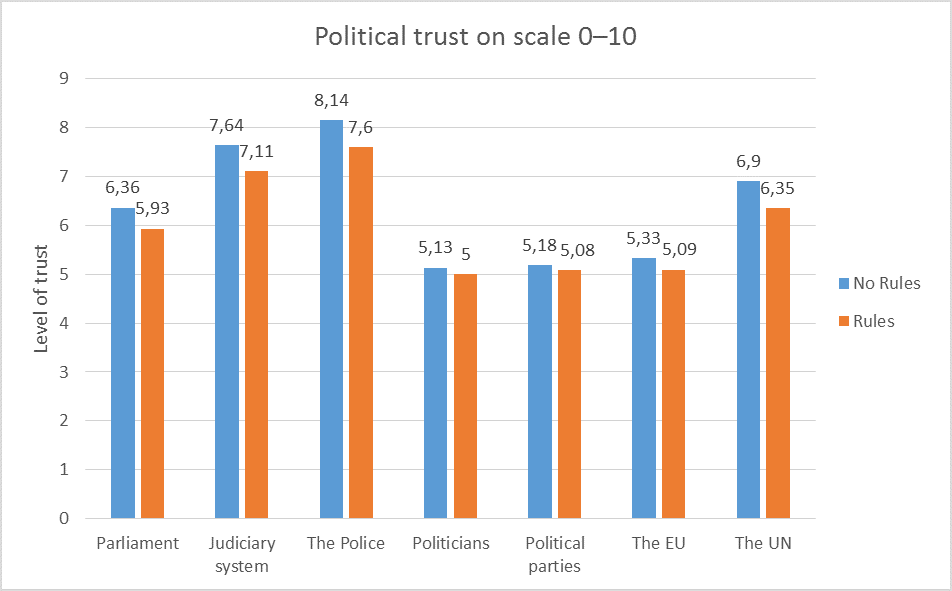KIM STRANDBERG
How is political and institutional trust among individuals affected if they discuss a political matter with their peers? We tested this in an experiment where citizens discussed the position of the Swedish language in Finland. The results concerning political trust were somewhat surprising.
According to theory about citizen deliberation, discussions between lay citizens are expected to have several beneficial effects. The deliberating citizens might, for instance, become less extreme in their opinions upon deliberation or increase their knowledge about political matters. But what about political trust and trust for other societal institutions? Is this at all affected by deliberating and, if so, in what ways?
An increase in political trust is often listed alongside effects such as increased political efficacy, interpersonal trust and readiness for political activity as one of many potential so-called side-effects of deliberation. The logic of this is mostly that as citizens discuss among each other they increase their civic skills and capacity for political thinking and behaviour as a positive spill-over from interacting in civil ways with other people. But does it matter in what way you deliberate when it comes to affecting political trust?
In deliberative theory there are several traits of the discussion which are highlighted as crucial if a discussion is to be considered truly deliberative and have a potential to bring about the aforementioned effects. Ideally, the discursive process should contain rational and critical argumentation based on facts, not opinions or prejudice, between free and equal citizens.Needless to say, these kind of discussion seldom materialize by themselves whereby some form of discussion rules alongside facilitation is often used in deliberation.
In our experiment we set out to test what bearing such facilitated deliberation had on the outcomes on deliberation, as compared to discussions where facilitated deliberation was lacking.
Before I present our findings regarding political trust, the design of the experiment might need some explaining. First of all, it was held simultaneously face-to-face and online in November 2014. More than 200 citizens took part, 66 of which online and the rest face-to-face.
Secondly, the topic which was up for discussion concerned the position of the Swedish language in Finland, which at the moment of the experiment was a rather salient issue in Finnish society. There was, for instance, a citizens’ initiative to be discussed in Parliament whose supporters proclaimed that the previously compulsory learning of Swedish in schools would be made voluntary.
The actual discussions contained 6-8 citizens who discussed for about two hours. All discussants in each group were of similar opinion about the topic, either con or pro. The groups were so-to-speak like-minded. Half of the discussion groups discussed using rules and facilitation while the other half did not. Each participating citizens was randomly assigned to either one of these treatments.
All participants answered a post-test survey immediately after the discussions had ended. Among many different topics, the questionnaire contained questions about the extent — on a scale from zero to ten where ten equals the maximum level of trust — to which the participants felt that they trusted various societal institutions. By comparing the post-deliberation levels on this scale for the citizens who discussed with facilitated deliberation to those who did not, we were able to gauge the impact of deliberation on political trust and trust for societal institutions.
The citizens who had discussed without any rules or facilitation were actually higher in levels of trust post-deliberation than the citizens who had discussed using facilitated deliberation.
The results of this comparison can be seen in the figure below:

The differences concerning trust for the judiciary system, the police and the UN were statistically significant and the one regarding the Parliament close to significant. This finding seemed puzzling to us since it basically went against the expectations set out by the literature that deliberation should affect trust positively.
But what if a positive effect does not necessarily always mean that you start trusting more? Maybe, one might ponder, isn’t a more critical stance towards society’s institutions among the citizenry just as important for a healthy democracy?
A tentative conclusion of our findings may suggest that instead of fostering trusting citizens, given certain circumstances, deliberation could also have the effect of fostering critical citizens.
Kim Strandberg is Adjunct Professor in political science in Åbo Akademi University and project researcher in CONTRE.


Comments